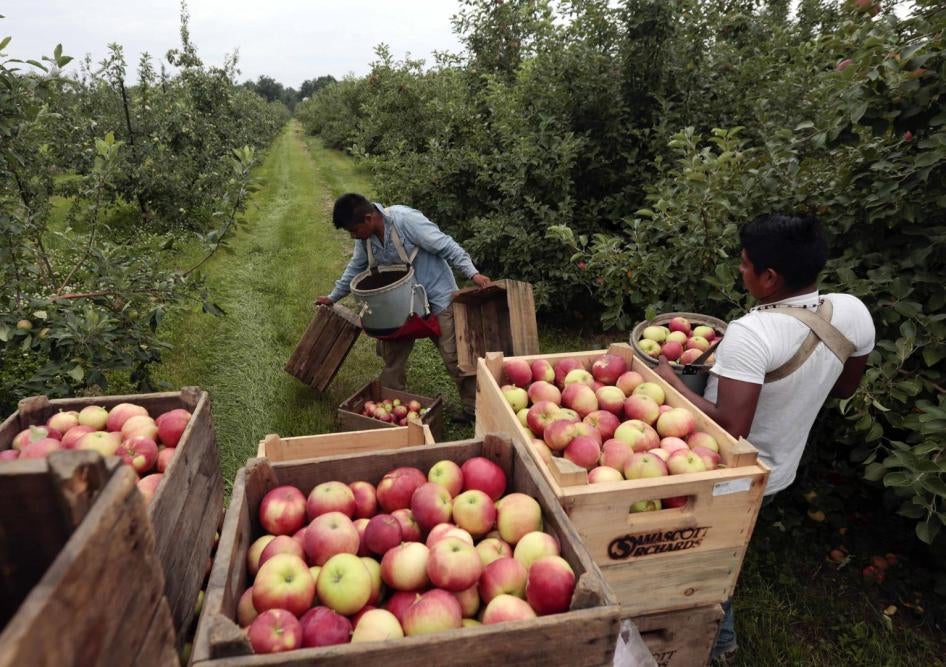(New York) – New York Governor Andrew Cuomo defended children, workers, and the environment by directing the state Department of Environmental Conservation on December 10, 2019 to ban the toxic pesticide chlorpyrifos, Human Rights Watch said today. The governor told the department to immediately prohibit all aerial spraying of chlorpyrifos and to enact regulations to ban all uses except for the spraying of apple tree trunks by December 2020. The governor mandated a ban of all uses, including for apple tree trunks, by July 2021.
A bill to ban the pesticide passed through the New York state legislature in April with strong bipartisan support. The governor vetoed the bill on December 10, choosing instead to mandate new regulations. Human Rights Watch urged the governor to sign the bill, warning that a regulatory approach could leave some chlorpyrifos in use and in other ways be less protective than legislation.
“Governor Cuomo stood up for public health and human rights by restricting the use of toxic chlorpyrifos,” said Margaret Wurth, senior children’s rights researcher at Human Rights Watch. “Human Rights Watch and other advocates are ready to hold him to his promise to ban the use of this pesticide entirely by July 2021.”
Earlier in 2019, the Trump administration announced that it would not ban chlorpyrifos, despite the evidence that it is a danger to human health. New York’s attorney general, Letitia James, is leading a coalition of state attorneys general in suing the federal government for its inaction on chlorpyrifos. Several members of Congress from New York are working to pass a national ban on chlorpyrifos.
Governor Cuomo’s directive makes New York the third state in the United States to restrict use of the chemical, which has been shown to harm brain development in children. Hawaii passed a law to ban the chemical by 2022, and California announced a ban to take effect in 2020.
The European Union announced on December 6 that it will ban chlorpyrifos beginning in 2020, after the European Food Safety Authority concluded that no amount of chlorpyrifos exposure was safe.
More than 80 other organizations supported the New York state bill to ban chlorpyrifos, including the New York state chapter of the American Academy of Pediatrics, representing more than 5,000 state pediatricians.
The Farm Bureau, a lobbying group that represents the agricultural industry, urged the governor to veto the bill and pursue regulations, the approach he ultimately adopted. A spokesperson for the New York Farm Bureau told Bloomberg Environment that the governor’s veto showed he “understands that there are new threats from invasive species to agriculture production and a permanent legislative ban would have ruled out all future use [of chlorpyrifos] should it be needed.”
Human Rights Watch opposes any use of chlorpyrifos, given the evidence of its dangers to human health.
Human Rights Watch has documented the exposure of children and workers to toxic substances in a range of countries, including Bangladesh, Brazil, China, Indonesia, Kenya, and Zimbabwe. In the US, Human Rights Watch found that children working in agriculture are often exposed to pesticides and reported acute health effects after exposure, including vomiting, nausea, dizziness, and headaches. Pesticide exposure is harmful for farmworkers of all ages, but children are uniquely vulnerable because their bodies and brains are still developing.
Research has shown chlorpyrifos to be particularly harmful to human health. Prenatal exposure has been linked to autism spectrum disorder, reduced IQ, and a range of disabilities in learning, memory, and attention in children. In adults, it has been linked to cancer and Parkinson’s disease.
Prior to the governor’s announcement, chlorpyrifos was approved for dozens of uses including on food crops such as apples, corn, brussels sprouts, broccoli, and cauliflower, and on golf courses.
“While the Trump administration disregards science and refuses to ban chlorpyrifos, Governor Cuomo and New York’s leaders are fighting to protect the public from a pesticide that can cause serious and irreparable harm,” Wurth said. “President Trump should follow suit and ban this toxic chemical.”








